This smoky homemade Chili Paste is essential to making a flavorful bowl of Texas-Style Chili. It’s totally customizable to your heat preferences since you get to choose the chilies that go into it!
If you’re a lover of spicy food, you probably have a collection of your favorite ground chili powders in your pantry, at least a bottle or two of hot sauce, and maybe a jar of store-bought chili paste. Have you ever tried making your own chili paste at home? It’s easy, completely customizable, and a fantastic flavor booster for a number of dishes.
Chili paste is typically made from toasted and reconstituted dried chilies, and is more deeply-flavored than most powders and hot sauces. It’s an essential component to dishes like Texas Red Chili, where the meat is simmered in a simple sauce made from chili paste and stock.
Seasoned with ground cumin, the smoky Chili paste I’m sharing with you in this post is well-suited to American dishes like Chili con Carne. By changing up the types of chilies and seasonings you use, you can also make chili pastes for international cuisines, such as this Indo-Asian Red Chili Paste, or Thai Nam Prik Pao.
Read more about the different types of Chili pastes in this Chili Paste Primer from Food52.
Kitchen Safety: Working with Hot Chilies
Chili peppers are scored in heat units according to the Scoville scale. The spiciness of the pepper is determined by the concentration of capsaicin it contains. The higher the amount of capsaicin, the hotter the pepper. (Read: “How Does the Scoville Scale Measure the Exact Hotness of a Pepper?“)
High amounts of capsaicin can be an irritant to the eyes and airways (hence, why it’s used in personal defense pepper spray). Since capsaicin can be released into the air during preparation and cooking processes, it’s important to take precautions to minimize irritation in the kitchen.
Wear gloves when handling hot peppers, wash your hands afterwards, and avoid touching your eyes. If you’re particularly sensitive or using peppers that are high on the Scoville scale, consider wearing goggles. Some cooks even shield their mouths and noses with a damp piece of cloth to minimize coughing. (Check out “Why Do Chile Peppers Make People Cough?” for more about this.)
Choosing Dried Chilis
Making chili paste at home allows you to customize it to your heat preferences. Even if you aren’t someone who enjoys really spicy food, you can still make a flavorful chili paste that won’t knock your socks off with heat.
As a lightweight in spice tolerance, I like to make my chili paste in the MILD TO MEDIUM range. To do this, I use a mix of dried Anaheim peppers (or “New Mexico,” 500-2500 Scoville Heat Units) and Ancho (dried Poblano, 1,000-1,500 SHU). (The Anaheim’s and Anchos are the dark chilies in this photos in this post.)
For a slight kick, I add a little chipotle pepper in adobo sauce. If you like your chili paste very mild, leave out the chipotle.
For SPICY chili paste, add a couple of chilies higher on the Scoville scale to your mix, such as Serrano (8,000-23,000 SHU) or Arbol (15,000-30,000 SHU). These types of peppers are small but mighty! Just a couple will pack a punch. Remember to take safety precautions (below) when handling hot chilies.
For the best flavor, the dried chilies you choose need to be as fresh as possible. Just like any dried herb or spice, dried chili products lose their luster as they age. Buy them from a store with good turnover to make sure that you’re getting chilies with the fullest flavor.

Homemade Chili Paste (Dried Chilies)
Ingredients
- 2 ounces dried chilies *see note
- 3 cups boiling water
- 1 chipotle pepper in adobo sauce , seeds removed
- 1 tablespoon adobo sauce
- 1 tablespoon ground cumin
- 2 teaspoons sweet paprika
- 1/2 cup room temperature water
Instructions
- Heat chilis in a skillet (I use cast iron) over medium-high heat for about 2 minutes per side, until fragrant. Chilies should not char.
- Place toasted chilies in a bowl and add enough boiling water to cover. Let stand for 30 minutes, turning chilies halfway through.
- Drain chilies and discard water. Cut each chili in half and remove and discard stems and seeds.
- Place chilies in a blender or food processor with chipotle pepper, adobo sauce, cumin, paprika, and 1/2 cup water. Blend until a smooth paste forms, scraping the sides as needed. You might need to add another tablespoon or two of water, depending on the chilies you've used.
- Transfer chili paste to a bowl and store, tightly covered, in the refrigerator for up to 5 days, or frozen for up to 6 months. (You can also freeze chili paste in ice cube trays, as you would pesto.)
Notes
Nutrition Estimate
Nutrition information is automatically calculated, so should only be used as an approximation.
About our recipes
Please note that our recipes have been developed using the US Customary measurement system and have not been tested for high altitude/elevation cooking and baking.


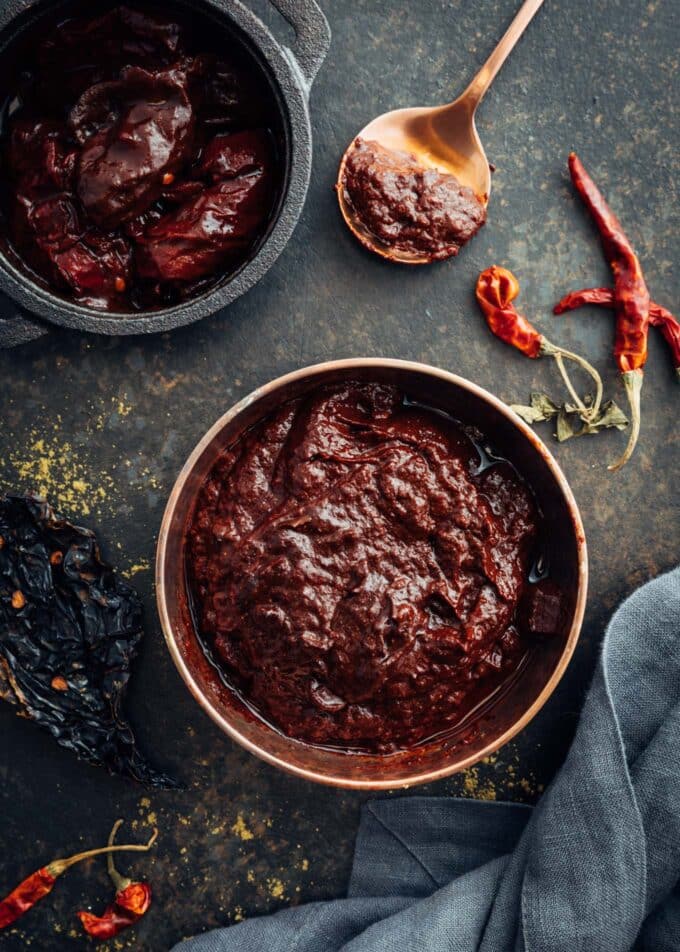
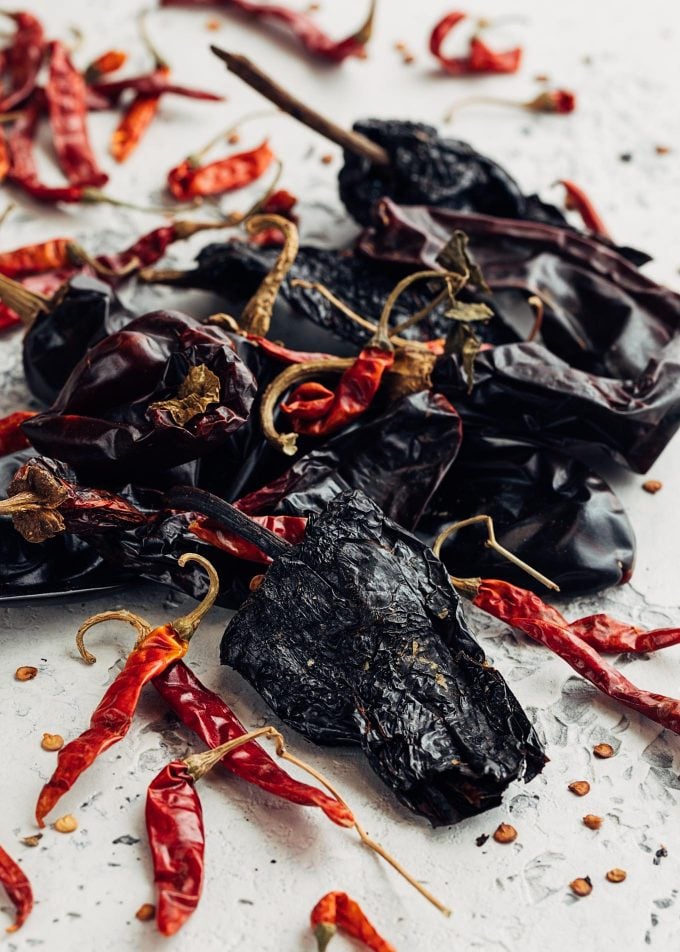
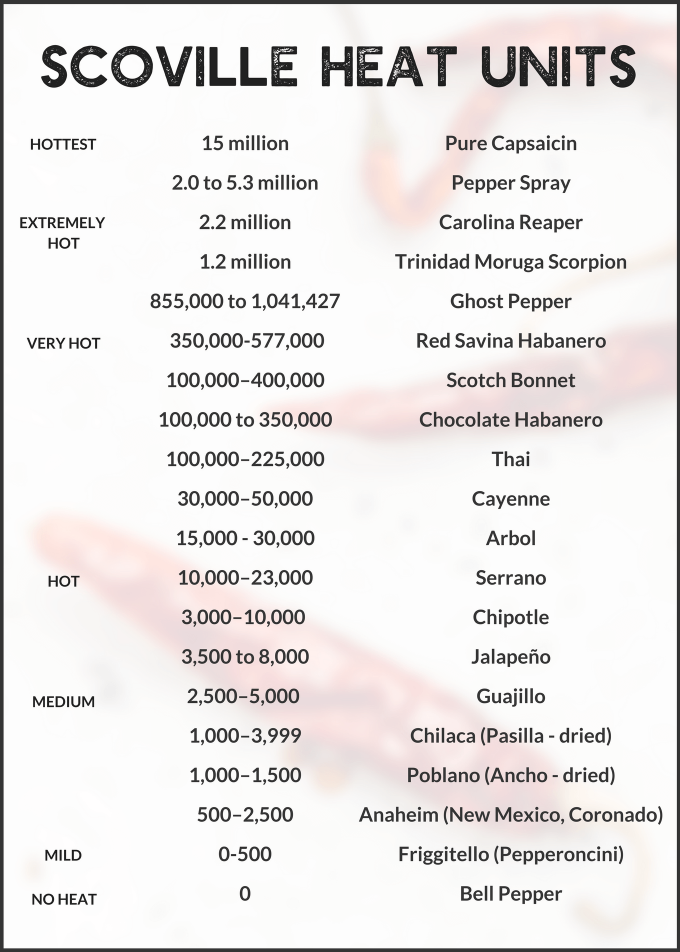
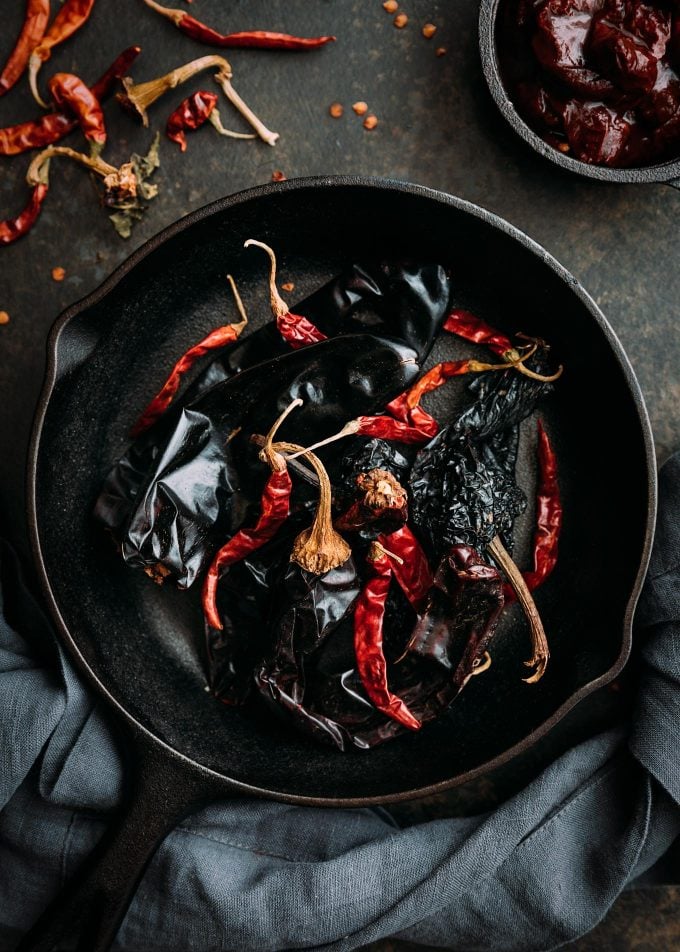

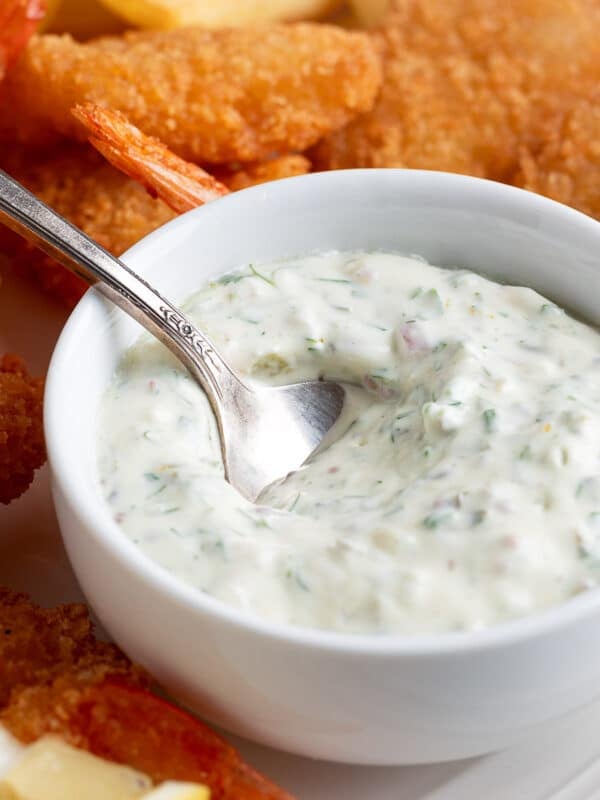












Question: for the 2 ounces of dried chilies, are you measuring by weight or do you mean 1/4 cup?
2 ounces of dried chilies by weight.
Thank you! I’m making it today, actually, so I wanted to make sure. :D
Excellent! Hope you enjoy!
Made this twice now for NFL Football Sunday pot-luck get-togethers (used your Texas Chili recipe with it). It was specifically requested by the host the second time. It was a hit both times judging by the empty bowl (never happened with any other bean chili in the past). In fact, I won a local chili cook-off with it as well. I provide black beans on the side for people to pour the chili over. Some folks loved pouring it over garlic mashed potatoes at the last event! Excellent pair of recipes.
I’m so glad you enjoyed both recipes, Danilushka! That’s so fantastic that you won the cook off with it, and that your event host requested it! You’ve made my day with this wonderful feedback. The chili paste really does make a difference in the chili, doesn’t it? Now, I’m craving trying it with garlic mashed potatoes–delicious! Thanks so much for your lovely comment.
Happy Cooking,
Amanda
This is the way I make it. It’s so much better than even high quality chili powders. The only thing I do differently is that I don’t discard the soaking water. I reserve enough to make the paste and then I use the remainder to replace a portion of the stock in the chili or beans.
This is the best way to make chili, I will never use chili powder again.
I have never made homade chili paste before but I would love to try and really appreciate all the info in this post! And oh my goodness, the photos alone are enough to make me start drooling! Gorgeous!
I love this!!! I grow hot peppers all summer long and never know what to do with them all- I’m totally going to make paste out of them! I wonder if I need to dry them and then reconstitute them first?
WOOHOO!!! I did it. It tastes fabulous. Had a bunch of dried chilies— used them all. Made almost 3 cups. Will definitely freeze. We have retired to Playa del Carmen. Chili powder is hard to come by in this part of Mexico. Dried peppers are not. We drove all the way from Laredo to Playa del Carmen. None of the food in the interior of Mexico beats good old Tex-Mex.
Can I take the seeds out of the chilies after I roast them? It is so messy getting the seeds out after they have been sitting in the hot water for 30 minutes. Let me know, and thank you for the recipe and info.
Nora